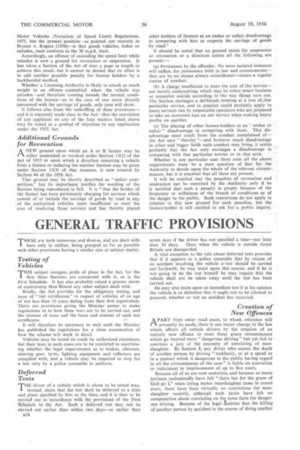GENERAL TRAFFIC PROVISIONS
Page 58

If you've noticed an error in this article please click here to report it so we can fix it.
THESE are both numerous and diverse, and are dealt with I here only in outline, being grouped so far as possible with other provisions having a similar aim or subject matter.
Testing of Vehicles
'THIS subject occupies pride of place in the Act, for the I first three Sections are concerned with it, as is the First Schedule. It has also probably raised agreater storm of controversy than almost any other subject dealt with. Briefly, the Act provides for the obligatory testing, and issue of "test certificates," in respect of vehicles of an age of not less than 10 years dating from their first registration. There arc provisions giving the Minister power to make regulations as to how these tests are to be carried out, and the manner of issue and the form and content of such test certificates.
It will therefore be necessary to wait until the Minister has published the regulations for a close examination of how the scheme will work in detail.
Vehicles may be tested on roads by authorized examiners, but their tests in such cases are to be restricted to ascertaining whether the legal requirements as to brakes, silencers, steering gear. tyres, lighting equipment and reflectors are complied with, and, a vehicle may be required to stop for a test only by a police constable in uniform.
Deferred Tests
THE driver of a vehicle which is about to be tested may, instead, claim that the test shall be deferred to a time and place specified by him at the time, and it is then to be carried out in accordance with the provisions of the First Schedule to the Act Such a deferred test may not be carried out earlier than within two days—or earlier than
a24 seven days if the driver has not specified a time—nor later than 30 days. Days when the vehicle is outside Great Britain are disregarded.
A vital exception to the rule about deferred tests provides that if it appears to a police constable that by reason of an accident involving the vehicle atest should be carded but forthwith, he may insist upon this course; and if he is not going to do the test himself he may require that the vehicle shall not he taken away until the test has been carried out.
He may also insist upon an immediate test if in his opinion the vehicle is so defective that it ought not to be allowed to proceed, whether or not an accident has occurred.
Creation of New Offences
APART from other road users, to whom reference will presently be made, there is one major change in the law which affects all vehicle drivers by the creation of an entirely new offence to meet those grave circumstances which go beyond mere "dangerous driving" but yet fail to convince a jury of the necessity of convicting of manslaughter. By Section 8, any driver who causes the death of another person by driving " recklessly, or at a speed or in a manner which is dangerous to the public having regard to all the circumstances of the case" is liable on conviction or indictment to imprisonment of up to five years. Because all of us arc now motorists, and because so many jurymen undoubtedly have felt "there but for the grace of God go I," when trying motor manslaughter cases in recent years, there have been virtually no convictions for manslaughter recently, although such juries have felt no compunction about convicting on the same facts for dangerous driving. Because of the legal aoctrine that the killing of another person by accident in the course of doing another




































































































